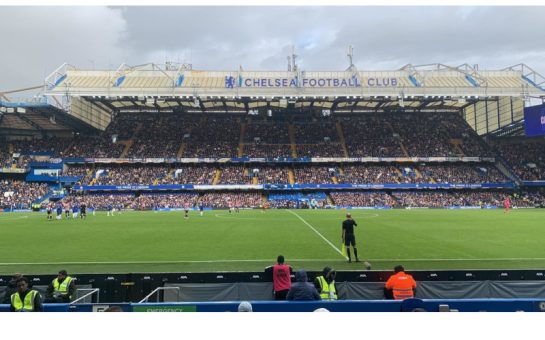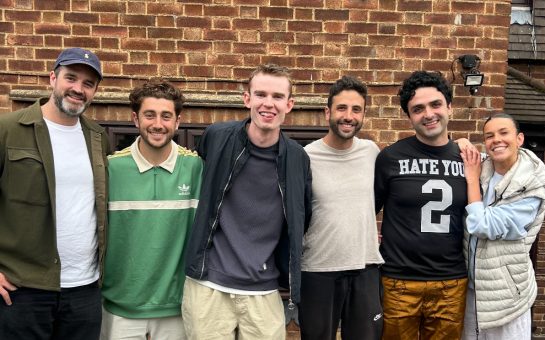The striker was a crowd favourite at Craven Cottage and Loftus Road.

In September 1976 Rodney Marsh had the Craven Cottage crowd on their feet laughing during an entertaining 4-1 win against Hereford United.
It wasn’t just Marsh’s two goals – one an absolute wonder strike – that had won their smiles, but the sight of him and Fulham teammate George Best tackling each other in jest.
Such highlights meant that Marsh was, and remains, one of the most recognisable faces in English football. A self-confessed maverick, Marsh first burst onto the top-flight scene with Fulham before enjoying a long and eventful career at QPR, Manchester City and in America.
Effervescent, precocious and individual – Marsh was one of football’s entertainers. In his own words, he played the game to please the crowd.
Growing up in London’s east end, he was a youth player at local club West Ham United. In 1960, however, he was released after failing to conform to their style.
“West Ham was the academy of football in those days. But they said I wasn’t good enough,” explains Marsh. “From one point of view they were right, but from another of course they were terribly wrong!
“I wasn’t really a West Ham-type player. West Ham in those days was, and still is, what I call a method club. I was a maverick, a loose cannon, somebody that was unreliable, and that’s how I was born and raised.
“I would do unexpected things on a football pitch and you could never look at Rodney Marsh and say you knew what was coming next – that didn’t suit West Ham.”
Instead, the teenage Marsh spent the next six years at first division Fulham. Born in Hatfield, Hertfordshire, his family could not afford to move nearer to west London, and Marsh would travel on three buses and a tube to get to Fulham, starting at 7am to be there for 9.
“At Fulham they had a much more off-the-cuff style. They also had Johnny Haynes, England captain, who played that way, where you never knew what he was going to do. I think Fulham were grooming me that way – to be the next Johnny Haynes.”
In 1963 Marsh made his Fulham debut against Aston Villa at the age of 18. A replacement for the injured Haynes, he scored the only goal in a 1-0 victory – a volley, which prompted manager Bedford Jezzard to say: “No boy could have had a better first game.”
During his first full season in the First Division, 1964-65, Marsh was Fulham’s top-scorer with 17 goals. But soon after he fell out with new boss Vic Buckingham, whose philosophy clashed with Marsh’s, and the young man was sacked.
Had it not been for Buckingham, Marsh said he would have remained at Craven Cottage for years. Instead the 21-year-old signed for Queens Park Rangers in 1966, who were in the Third Division.
“It was one of those decisions which I made from my heart and not my head. QPR just seemed right. I wasn’t looking ahead too much, my attitude was just to play. I just loved playing football, entertaining the crowd and being spontaneous.
“Alec Stock [QPR manager] had said: ‘Rodney, I’ve watched you play many times. There is no system here for you to play in. You just play football and I’ll have all the other players adjust around you.’ Nobody had ever said anything like that to me in my career!”
In his first season at Loftus Road, during which QPR were promoted, Marsh scored 44 goals. It was the start of six unforgettable years, as he helped the team secure back-to-back promotions to the First Division in 1968.
“The vibe at Loftus Road was stunning as was the reaction I got from the fans. I never had one incident of dissent from anybody at QPR – they were all just lovely and I love them back. I would do things during games that only if you were there as a fan you would appreciate it.
“I never used to go back and help defend corner kicks, for example, and one day we were under pressure at Loftus Road. Corner after corner came against us, and at this one corner the ball came in and our goalkeeper parried it down, and in the middle of our own six yard box I nutmegged the opposition player coming in and hit a 60-yard pass to Mark Lazarus. He then went on and scored a goal!”
Marsh names his defining goal as the equaliser he scored against West Bromwich Albion in the 1967 League Cup final, a match QPR won 3-2.
However QPR could only manage one season in the First Division and after two years trying to regain their top-flight status Marsh, who by now was a cult hero at Loftus Road, transferred to giants Manchester City.
At 27 Marsh made his England debut against Switzerland in 1971.
“It was very late when England approached me. I didn’t take it personally at the time because we’d just won the World Cup.
“In 1966 the England World Cup team played England B at Highbury. I was playing for England B, 22 years old, and we beat the first team 5-1. I scored twice! After that I thought to myself, if I’m not going to be in this England team soon then it’s going to be a problem!”
Manchester City paid a club-record fee of £200,000 for Marsh’s services in 1972. They were top of the First Division, but looking back Marsh believes they justified the large transfer fee.
“In 1972 Manchester City were a fantastic team flying away at the top of the league with an average attendance of 34,000. My first game was against Chelsea, and the crowd that day was 55,000. Let’s say fans paid £7 entry, that’s almost £147,000 recouped after my first game!
“Between then and the end of the season the club probably made a million pound profit on me. I remember Malcolm Allison [City manager] telling me on the day I joined that I was on a crowd bonus.”
Over the next four years Marsh won the Charity Shield in 1972 and a League Cup runners-up medal in 1974 for the Sky Blues. But Manchester City did not win the league the year in which Marsh joined the club.
Many people have blamed Marsh’s disruptive influence for costing City the championship, and such accusations have plagued him for the last 40 years.
“I came from QPR where I was a big fish in a small pond, and when I joined Maine Road I thought I was just going to become another one of the lads. But it didn’t work out that way, I became even bigger than I ever had been at QPR.
“It astounded me. Everything was about Rodney Marsh. I regret it because I had no control over that, about causing animosity in the dressing room. There were players at Maine Road who really hated me, I think because of the notoriety I had gotten.
“I didn’t want to be the person responsible for Man City missing out on the championship. I regret that and I feel sorry for what happened.”
Despite this it was testament to Marsh’s character and ability as a footballer that he still became a City legend.
On his return to QPR with Manchester City he scored – a bicycle kick of the highest order. He also scored at Old Trafford during a Manchester derby, something he did with every English club he played for.
In 1976 Marsh moved to Tampa Bay Rowdies in America. Bar a brief return to Fulham later that year to play alongside old friend George Best he has lived in the United States on-and-off with his family ever since.
By the time he retired in 1979, Marsh had cemented his reputation as one of the greatest and most entertaining players of his generation.
Follow us @SW_Londoner




